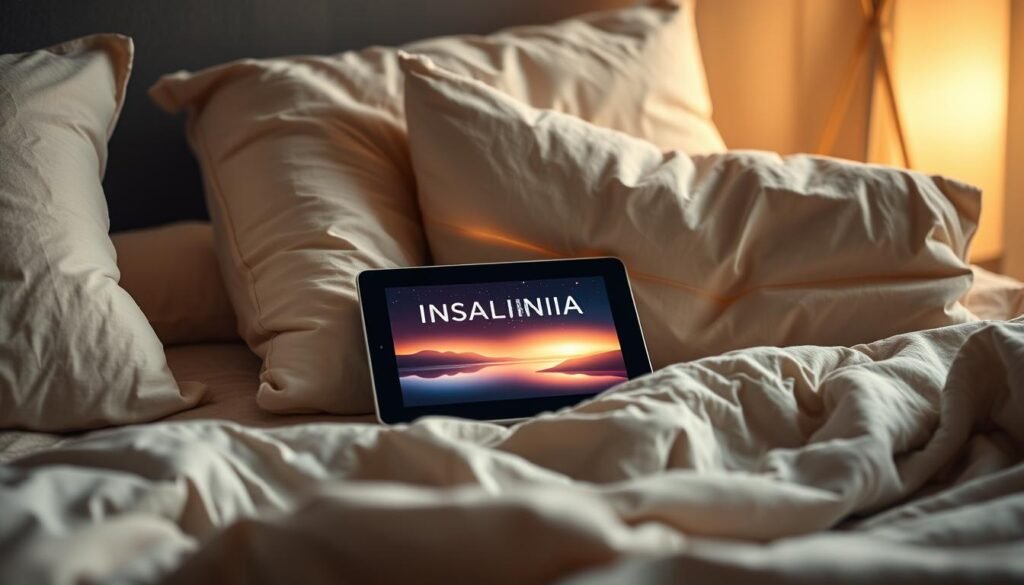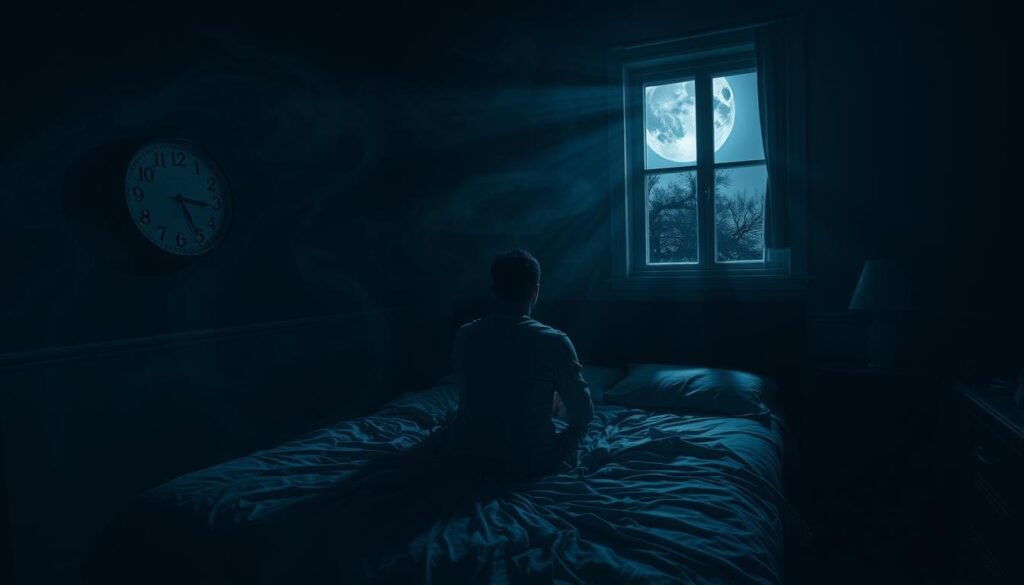Recent studies show that up to 30% of adults worldwide face insomnia symptoms at some stage. This issue affects their quality of life and increases health costs. Research into insomnia is growing, pointing out the need for better treatments and knowledge of its causes.
The study of insomnia therapy is progressing, revealing new methods and drug advancements. Insights into insomnia highlight cognitive behavioral therapy (CBT) as the most effective treatment, with success rates of 74% to 81%. Yet, 19% to 26% of individuals might not find relief through CBT, especially those with other mental health issues.
This article looks into the latest findings on insomnia, covering sleep problems, causes, and new treatments. By reviewing scholarly papers on insomnia, readers will understand more about this condition. It shows its impact on people and society at large.
Key Takeaways
- Up to 30% of adults report experiencing insomnia symptoms, affecting their daily lives.
- Cognitive behavioral therapy (CBT) offers a success rate of 74% to 81% in treating insomnia.
- A significant portion of patients, between 19% to 26%, may resist traditional therapies, especially if they have existing psychiatric conditions.
- Newer treatments, such as melatoninergic receptor agonists, are emerging as safer alternatives to older medications.
- Insomnia is more frequently reported in women and older adults, particularly those with other medical or psychological conditions.
Introduction to Insomnia and its Prevalence
Insomnia is a common sleep problem. It makes starting or keeping sleep hard. The rate of insomnia varies a lot, from 10% to 40% in different groups. This shows how sleep issues can affect people differently.
About 10% have chronic insomnia, which really changes lives. A study in South Korea showed 17% might have insomnia. But only 5% were officially diagnosed. This shows diagnosing chronic insomnia is hard.
Who is at risk? Mainly women, older adults, and people with certain health issues. Nearly half of those with insomnia also have a mental health problem. It can lead to depression and anxiety, hurting many parts of life.
The costs of insomnia in the U.S. are huge, over $100 billion a year. This highlights the need for better treatments. Understanding how widespread insomnia is can help us deal with it better.
| Study | Insomnia Prevalence | Notes |
|---|---|---|
| Ford & Kamerow (1989) | 10% – 40% | Wide range in estimates |
| Ohayon & Hong (2002) | 17% | Based on frequency criteria |
| National Institutes of Health (2005) | 10% | Requires daytime distress |
| Roth (2007) | 5% – 10% | Specific insomnia disorders |
| Bastien et al. (2004) | N/A | Common precipitant events |
Understanding Insomnia as a Sleep Disorder
Insomnia is a complex sleep disorder classification affecting many adults worldwide. The term insomnia definition includes trouble falling asleep, staying asleep, waking up too early, or not feeling rested. About 30% of adults experience insomnia symptoms yearly, with 6% to 15% getting diagnosed.
Insomnia comes in two main types: acute and chronic. Acute insomnia is short-term, often caused by stress, and lasts a few days to weeks. Chronic insomnia is long-lasting, over a month, and may point to deeper issues. Knowing the difference helps in finding the right treatment for sleep problems.
Insomnia often occurs with other health and mental issues, which makes diagnosing it harder. Nearly 75%-90% of people with insomnia may have another medical condition. Also, 40% of insomnia patients suffer from a mental disorder like depression. Factors such as age and gender influence who gets insomnia, with women and the elderly being more prone.
Understanding and tackling insomnia is critical for enhancing physical and mental health. Improving sleep habits and sleep hygiene can reduce insomnia’s negative effects. For those looking to learn more about behaviors that can worsen insomnia, focusing on screen time and stress relief is useful. Check this helpful resource for more insights.
| Type of Insomnia | Duration | Common Causes | Comorbid Conditions |
|---|---|---|---|
| Acute Insomnia | Less than a month | Life stressors, changes in environment | Anxiety, temporary depression |
| Chronic Insomnia | One month or more | Underlying health issues, poor sleep habits | Major depression, chronic pain |
Latest Research on Insomnia Scholarly Articles
Insomnia research has recently advanced, especially in customized therapies and new drugs. Studies highlight effective treatments for this common sleep problem. Doxepin and ramelteon are top choices with strong scientific backing.
Recent discoveries offer hope for chronic insomnia sufferers, affecting 10% to 30% of adults. However, not everyone benefits from cognitive therapy, with 19% to 26% seeing no improvement. This situation underscores the need for more personalized treatment strategies.
Cognitive behavioral therapy (CBT) for insomnia has earned the American Academy of Sleep Medicine’s endorsement. As of early 2021, it’s a top-recommended option. Both in-person and online CBT sessions have proven effective.
Now, light therapy is emerging as a helpful tool for those with offbeat schedules or jet lag. Also, acupuncture is gaining popularity for its potential in improving sleep. These findings suggest exploring various treatments could lead to better results.
| Therapy Type | Effectiveness | Pros | Cons |
|---|---|---|---|
| Doxepin | Highly effective for sleep maintenance | Proven efficacy | Potential side effects |
| Ramelteon | Effective for sleep onset | Non-habit forming | Limited research on long-term use |
| CBT-I | High success rate, especially in structured settings | Long-lasting benefits | Not suitable for all individuals |
| Light Therapy | Helpful for irregular schedules | Non-invasive | Requires consistent application |
New therapies and ongoing research are changing how we address insomnia. Many studies delve into its complexities. This work aims for better management and outcomes. For further information, check out the latest insomnia research. Understanding insomnia better means improving and expanding care, benefiting many with sleep issues.
Causes and Risk Factors Associated with Insomnia
Many things can cause insomnia to start and keep happening. Knowing what causes insomnia is key to finding good treatments. Genetics play a big part; studies have found genes related to sleep problems. Light from the environment is another big cause. It messes up our natural sleep cycles and hurts how well we sleep.
Genetics and Hereditary Links to Insomnia
Some genes make people more likely to have insomnia. Research shows that if your family has sleep issues, you might too. This is because of genes that affect how our brain chemicals work. These make us more prone to insomnia.
The Impact of Light Pollution on Sleep
Light pollution is a big problem for sleep. Too much artificial light at night makes more people use sleep meds, especially in cities. It ruins our natural sleep cycles and makes it hard to sleep. Bright lights at night also stop melatonin, which we need for good sleep, from working right.
| Risk Factor | Effect on Sleep |
|---|---|
| Genetic Predisposition | Increased likelihood of insomnia symptoms |
| Light Pollution | Disruption of circadian rhythms |
| Lack of Reading Habits | Higher association with insomnia symptoms |
| Rural vs Urban Living | Varied prevalence of insomnia symptoms |
Medication Advances in Treating Insomnia
The world of insomnia treatment is changing. New medicines are coming out that work better for sleep problems. Among these are orexin receptor antagonists and melatonin, which help in unique ways. About 14% of people suffer from chronic insomnia, making the need for good insomnia medications higher than ever.
Orexin Receptor Antagonists: A New Therapeutic Class
Orexin receptor antagonists are a new kind of pharmacological treatment for insomnia. They target the neurotransmitters that keep us awake. Drugs like Suvorexant (Belsomra) and Lemborexant (Dayvigo) are FDA approved. They help with both falling asleep and staying asleep. These medications block the orexin system, which controls arousal. This action helps you sleep better and longer. Research shows they greatly lessen insomnia symptoms, proving their value in treatment.
Melatonin’s Role in Sleep Regulation
Melatonin is a hormone that the pineal gland makes. It’s crucial for our sleep-wake cycles. As an insomnia medication, melatonin supplements are popular. They help with the timing of sleep, useful for people who have trouble falling asleep. While safe, it’s important to get the dose right for the best effect. Studies suggest low doses can improve sleep with few side effects. This makes melatonin a good choice for those looking for natural options along with medication.
New treatments for insomnia show a lot of promise, but don’t forget about behavioral changes. Cognitive behavioral therapy for insomnia (CBT-I) works well over the long term, often better than medication alone. Knowing about all the medication options and using behavioral strategies can make a big difference. It can improve the lives of those struggling with chronic insomnia and its negative effects on daily activities.
For more details, click here: recent research insights.
Cognitive Behavioral Therapy for Insomnia (CBT-I)
Cognitive Behavioral Therapy for Insomnia, or CBT-I, is a top method for treating insomnia. It focuses on changing thoughts and behaviors that hurt sleep quality. Effectiveness of CBT-I often beats traditional drugs used for sleep problems. By changing negative thoughts and promoting good sleep habits, a lot of people sleep better over time.
Effectiveness of CBT-I as a First-Line Treatment
About 6–10% of adults suffer from chronic insomnia. It’s a common problem. CBT-I offers a way to better sleep without drug side effects, like feeling foggy or having a bad morning. Techniques like Cognitive Therapy help set realistic sleep goals. Meanwhile, Stimulus Control Therapy helps build better sleep routines. Sleep meds increase sleep time, but CBT-I not only matches these benefits – it also leads to lasting improvements and less bedtime delays.
Digital Therapy: CBT-I Delivered Through Apps
Now, digital sleep therapy makes CBT-I easier to access. Many apps let people follow CBT-I programs easily. These apps have tools to combat insomnia from different angles, based on cognitive behavioral therapy. Also, using these apps often makes more people look for effective sleep solutions, helping more folks become knowledgeable about mental health.

| CBT-I Benefits | Medication Benefits |
|---|---|
| No side effects | Quick onset of action |
| Long-term effectiveness | Short-term relief |
| Encourages sustainable habits | Temporary solution |
| Reduces sleep latency | Increases total sleep time |
For those dealing with insomnia, using CBT-I techniques through apps can be very helpful. These methods are getting more attention for their success. They show that better sleep doesn’t always need medication.
Alternative Therapies for Insomnia
Many people look for different ways to sleep better apart from usual practices. They try things like acupuncture and light therapy. These methods are getting good results for improving sleep and tackling insomnia’s root causes.
The Role of Acupuncture in Sleep Improvement
Acupuncture is becoming well-known for helping with sleep problems. Studies show it can make you sleep longer and wake up less during the night. Acupuncture works by targeting specific points on the body. It kickstarts the body’s healing, brings balance, and helps you relax. Many people say their sleep improves a lot, which shows acupuncture is a good choice for treating insomnia.
Effects of Light Therapy on Circadian Rhythm
Light therapy is great for getting your sleep cycle on track. It’s particularly useful for those with irregular sleeping times. The therapy involves exposure to certain types of light at set times. It’s aimed at resetting your internal clock. This therapy helps a lot if you’re experiencing jet lag or work shifts. It’s an essential part of many treatments to better sleep health.
| Alternative Therapy | Potential Benefits | Target Issues |
|---|---|---|
| Acupuncture | Improves sleep quality, reduces awakenings | Chronic insomnia, anxiety-related sleep issues |
| Light Therapy | Resets circadian rhythms, boosts sleep onset | Jet lag, shift work sleep disorder |
Insomnia and its Relation to Mental Health
Insomnia affects around 25 million people in the United States every year. It’s closely linked to mental health, with 8% to 40% of all people experiencing insomnia. Studies show its effects go beyond just bad sleep. It connects deeply with anxiety, depression, and other mental health issues.

Insomnia is not just a symptom; it may also cause serious mental health conditions. Over half the patients in sleep clinics report insomnia. Many of these people are also dealing with Major Depressive Disorder (MDD). This issue strongly increases the risk of mood disorders. For instance, those with insomnia have a much higher chance of developing depression later.
The connection between insomnia and mental health is two-way. The DSM-5 states chronic insomnia can link to other mental disorders. This shows we need to treat both for better health. If we ignore insomnia in people with mental health issues, the cycle of insomnia and depression worsens.
We must understand how insomnia impacts mental health to treat it effectively. Treatments like Cognitive Behavioral Therapy for Insomnia (CBT-I) can help. They are key in breaking the cycle and bettering mental health.
Link between Insomnia and Cognitive Impairment
Studies often link insomnia with cognitive problems. Many find that people with insomnia have trouble in several cognitive areas. This is compared to those getting good sleep.
It’s important to know these effects, especially for those with ongoing sleep issues.
Studies on Insomnia’s Long-term Effects on Cognition
A recent study looked at insomnia’s effects over a long time. It involved 25 adults with insomnia and 16 without it. The study showed big cognitive deficits in those with sleep issues.
Those with insomnia did worse on tests for attention, memory, and problem-solving. Their cognitive issues matched both what they felt and sleep test results.
Understanding Insomnia’s Connection with Mental Disorders
Insomnia often goes hand in hand with mental disorders. About 40% of people with insomnia also have mental health problems. This shows a strong link between the two.
There are two types of insomnia. One with short sleep, and one with normal sleep. Each affects the brain differently. Short sleep leads to more daytime problems and attention issues. Normal sleep leads to learning and memory challenges. These issues highlight the risks of not treating insomnia.
| Cognitive Domain | Impact in Insomnia |
|---|---|
| Working Memory | Mild to moderate deficits observed |
| Episodic Memory | Significantly poorer performance |
| Executive Function | Lower performance compared to non-insomniacs |
| Attention | Complex attention issues reported |
Insomnia Treatment Clinical Trials: Emerging Findings
Clinical trials are key in exploring clinical trials insomnia treatments. They test new drug therapies and examine treatments that mix behavior strategies with medicine. Recent new findings in insomnia research show a focus on how safe these new treatments are.
In the medication trials for insomnia, orexin receptor antagonists are creating a buzz. These studies show Orexin A and B affect receptors in different ways. This could lead to customized treatments for insomnia. Yet, Z-drugs have been shown to raise the risk of car accidents, highlighting the need for safer options.
A lot of work, with 132 trials, focuses on insomnia treatments. Out of these, 58 are about drugs, while 71 look into non-drug solutions. This shows a broad approach to solving insomnia. Digital Cognitive Behavioral Therapy for Insomnia, or dCBT-I, is getting a lot of attention. It’s followed by face-to-face CBT-I and medications like zolpidem.
These studies use many ways to assess insomnia, adding depth to our understanding. Tools like the Insomnia Severity Index and the Pittsburgh Sleep Quality Index are common. The drive for effective insomnia treatments is strong and ongoing.

| Intervention Type | Number of RCTs | Year of Median Publication | Average RCTs per Year |
|---|---|---|---|
| Digital CBT-I (dCBT-I) | 35 | 2019 | 1.13 |
| In-person CBT-I | 28 | 2018 | 0.90 |
| Zolpidem | 22 | 2008 | 0.71 |
| Pharmacological Treatments | 58 | N/A | N/A |
| Non-Pharmacological Treatments | 71 | N/A | N/A |
Conclusion
Insomnia research has shown that insomnia is more than just difficulty sleeping. It’s closely linked with physical, mental, and environmental factors. A blend of drug-related and other types of treatments is key. This approach is vital because insomnia often comes with other issues, like depression and anxiety.
A study covering 172,077 people over about 60 months has shed light on treatment needs. It found a strong link between insomnia and depression. This highlights the need for managing insomnia alongside mental health. Addressing both can majorly boost the success of treatments and patient health.
What’s next for insomnia research? It will look into new treatment methods. Since 20% to 35% of people generally experience insomnia, and 10% to 20% have serious cases, research is crucial. We need novel ways to understand and tackle it. For those interested in deeper information, check out a recent study here.